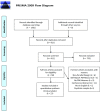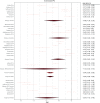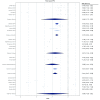The effects of licit and illicit recreational drugs on prospective memory: a meta-analytic review
- PMID: 31093722
- PMCID: PMC6591206
- DOI: 10.1007/s00213-019-05245-9
The effects of licit and illicit recreational drugs on prospective memory: a meta-analytic review
Abstract
Rationale: There are no recent reports summarising the magnitude of prospective memory (PM) impairments in recreational drug users.
Objective: We performed a meta-analysis of studies (with a parallel group design) examining PM performance in users of common recreational drugs (including alcohol and tobacco) who were not intoxicated during testing. Studies were also evaluated for the presence of methodological bias.
Methods: Twenty-seven studies were included in the meta-analysis following literature searches of MEDLINE, EMBASE and PsycINFO. Effect sizes (standardised mean difference; SMD) were calculated separately for the effects of alcohol, cannabis, ecstasy, methamphetamine and tobacco use. The influences of drug use and study characteristics on effect sizes were explored using meta-regressions. Sources of study bias were also assessed.
Results: Heavy drinkers and regular drug users tended to perform worse than controls on event and time-based PM tasks. Effect sizes (standardised mean differences; SMDs) for event-based PM impairment across the different drug-using groups/heavy drinkers ranged between - 1.10 and - 0.49, with no 95% CI crossing 0.00. SMDs for time-based PM ranged between - 0.98 and - 0.70. Except for the CIs associated with the ES for smokers' time-based PM performance, no CIs crossed 0.00.
Conclusions: Although all drug-using groups showed moderate-large impairments in event and time-based PM, effect sizes had low precision and moderate-high levels of heterogeneity. In addition, several methodological and reporting issues were identified in the majority of studies. As such, considerable uncertainty remains regarding the role of confounds and the magnitude of PM impairments in non-intoxicated recreational drug users.
Keywords: Alcohol; Cannabis; Ecstasy; Methadone; Methamphetamine; Opiate; Prospective memory; Tobacco.
Conflict of interest statement
The authors declare that they have no conflict of interest.
Figures




Similar articles
-
Prospective memory functioning among ecstasy/polydrug users: evidence from the Cambridge Prospective Memory Test (CAMPROMPT).Psychopharmacology (Berl). 2011 Jun;215(4):761-74. doi: 10.1007/s00213-011-2174-y. Epub 2011 Feb 8. Psychopharmacology (Berl). 2011. PMID: 21301817
-
Ecstasy (MDMA) and memory function: a meta-analytic update.Hum Psychopharmacol. 2007 Aug;22(6):381-8. doi: 10.1002/hup.857. Hum Psychopharmacol. 2007. PMID: 17621368
-
Neurocognitive function in current and ex-users of ecstasy in comparison to both matched polydrug-using controls and drug-naïve controls.Psychopharmacology (Berl). 2007 Oct;194(3):371-9. doi: 10.1007/s00213-007-0837-5. Epub 2007 Jul 1. Psychopharmacology (Berl). 2007. PMID: 17605005
-
Drug-related decrease in neuropsychological functions of abstinent drug users.Curr Drug Abuse Rev. 2011 Mar;4(1):42-56. doi: 10.2174/1874473711104010042. Curr Drug Abuse Rev. 2011. PMID: 21466500 Review.
-
Neurotoxicity of methylenedioxyamphetamines (MDMA; ecstasy) in humans: how strong is the evidence for persistent brain damage?Addiction. 2006 Mar;101(3):348-61. doi: 10.1111/j.1360-0443.2006.01314.x. Addiction. 2006. PMID: 16499508 Review.
Cited by
-
Understanding the Mechanisms of Action and Effects of Drugs of Abuse.Molecules. 2023 Jun 24;28(13):4969. doi: 10.3390/molecules28134969. Molecules. 2023. PMID: 37446631 Free PMC article. Review.
-
Recreational drug use and prospective memory.Psychopharmacology (Berl). 2022 Mar;239(3):909-922. doi: 10.1007/s00213-022-06081-0. Epub 2022 Feb 7. Psychopharmacology (Berl). 2022. PMID: 35129670
-
Indications of alcohol or drug use disorders in five different national registers in Sweden: a cross-sectional population-based study.BMJ Open. 2023 Sep 4;13(9):e070744. doi: 10.1136/bmjopen-2022-070744. BMJ Open. 2023. PMID: 37666553 Free PMC article.
-
Cognitive test performance in chronic cannabis flower users, concentrate users, and non-users.Sci Rep. 2023 May 18;13(1):8068. doi: 10.1038/s41598-023-35217-1. Sci Rep. 2023. PMID: 37202444 Free PMC article.
-
Substance abuse and susceptibility to false memory formation: a systematic review and meta-analysis.Front Psychol. 2023 May 5;14:1176564. doi: 10.3389/fpsyg.2023.1176564. eCollection 2023. Front Psychol. 2023. PMID: 37213356 Free PMC article.
References
-
- Brandimonte M, Einstein GO, McDaniel MA, editors. Prospective memory; theory and applications. Hillsdale: Erlbaum; 1996.
Publication types
MeSH terms
Substances
LinkOut - more resources
Full Text Sources
Medical
Research Materials

